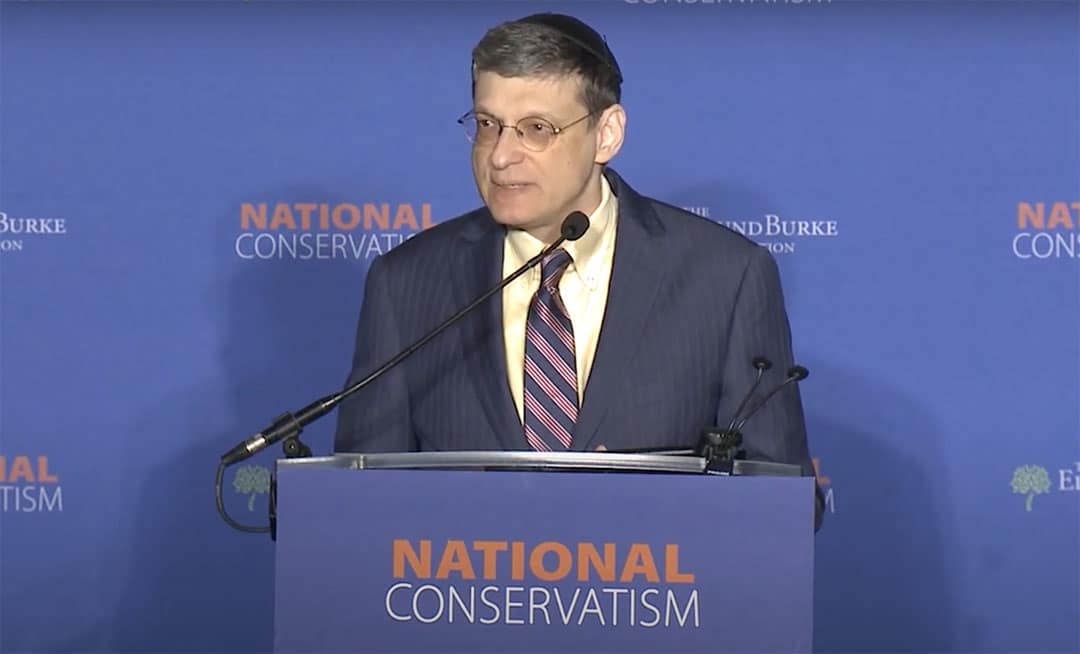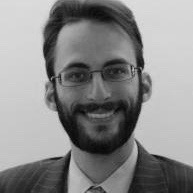 Yoram Hazony, Chairman of the Edmund Burke Foundation (Screenshot from YouTube)
Yoram Hazony, Chairman of the Edmund Burke Foundation (Screenshot from YouTube) ORLANDO, FLORIDA – Several speakers spoke on the role of Jewish values in politics at the National Conservative Conference, which took place October 31 through November 2 in Orlando, Florida. The conference was organized by the Edmund Burke Foundation.
The conference website describes itself as bringing “together public figures, journalists, scholars, and students who understand that the past and future of conservatism are inextricably tied to the idea of the nation, to the principle of national independence, and to the revival of the unique national traditions that alone have the power to bind a people together and bring about their flourishing.” It also states that “The return of nationalism has created a much-discussed ‘crisis of conservatism’ that may be unprecedented since modern Anglo-American conservatism was formulated by Russell Kirk, William Buckley, and their colleagues in the 1950s. At the heart of this crisis is a question: Is the new American and British nationalism a hostile usurper that has arrived on the scene to displace political conservatism? Or is nationalism an essential, if neglected, part of the Anglo-American conservative tradition at its best?”
Yoram Hazony, Chairman of the Edmund Burke Foundation, spoke about public norms and what the Jewish community needs from them. “Jews are about two percent of the United States, and this is true in other Western countries, that there are small Jewish communities that I can think of that are safe and flourishing in various countries,” said Hazony. “Jews are two percent of the population. What do Jews need of this country? What Jews need in this country is a carve out to be able to pursue their traditions, to send children to their schools, to not be persecuted, obviously not to be abused or killed. That’s what Jews need. Do Jews need to clear the public space from Christianity? I say no,” said Hazony.
Rabbi Yehoshua Pfeffer, head of the Haredi Israel division at the Tikvah Fund, hosted a panel on Anglo-American Conservatism. In the panel he discussed how Torah values influenced that tradition. “So much of the Anglo-American Conservative tradition are actually sourced in Torah biblical Jewish sources. So freedom, for example, derives to a large degree from the Exodus of the Israelites, of the Hebrews, from Egypt, which was their house of bondage. In Martin Luther King’s rhetoric, one of the most central themes was the Exodus of the Israelites from this house of bondage, which really represented the first movement towards freedom of people and of individuals,” said Pfeffer.
“The idea of family was very much instituted at the very same event of this exodus from Egypt. The pascal offering is offered as families, as households, as we find in Exodus chapter 12,” said Pfeffer.
“The idea of public morality, which is also a very central part of this tradition, the public space and morality of the public sphere, which was instituted by the Torah and by the Bible, and captured by the term ‘Moral Monotheism’, meaning the Monotheism that we espouse isn’t a Monotheism of just one G-d rather than many gods, but rather the G-d that also institutes, that also defines the way of life, the moral way of life. In Deuteronomy, when the Torah prohibits idolatry, one of the reasons isn’t just because it’s the wrong address, but because it’s immoral, because the payment system was inherently immoral,” said Pfeffer.
“The enshrinement of private property is such a central part of the Torah civic law in Exodus 21. The separation and limitations of powers of the monarch as we find in Deuteronomy 17. The idea of nation states with borders, that really begins from the Bible’s description of Israel, of the promised land as a land with borders, rather than empires,” continued Pfeffer.
In that same panel, Ofir Haivry, Vice President for Academic Affairs at the Herzl Institute, spoke about tradition and nationhood and the influence that British thinkers from John Selden to Edmund Burke had on the understanding on the relationship between the two. In discussing the relationship between a nation and a state, he noted than Seldon “argued that a nation could exist without a state. He brought the example of the Jewish nation, which in his time” (Seldon lived in England from 1584 to 1654) “he insisted, most other people in his time said that Jews are not a nation, they are just a religion, a creed. And he said no, they are a nation. The reason is because even in exile scattering, they voluntarily still adhere to their traditional national laws. That’s why they are a nation. Seldon’s thought combined natural law roots for all birthright legal systems with very different national branches growing out from there.”
This was the second National Conservative Conference held in the United States by the Edmund Burke Foundation. The Edmund Burke Foundation is public affairs institute founded in January 2019 with the goal of developing a revitalized conservatism for the age of nationalism already upon us.
Zachary Leshin is a writer and former congressional staffer based in Orlando, Florida.























 More news and opinions than at a Shabbat dinner, right in your inbox.
More news and opinions than at a Shabbat dinner, right in your inbox.